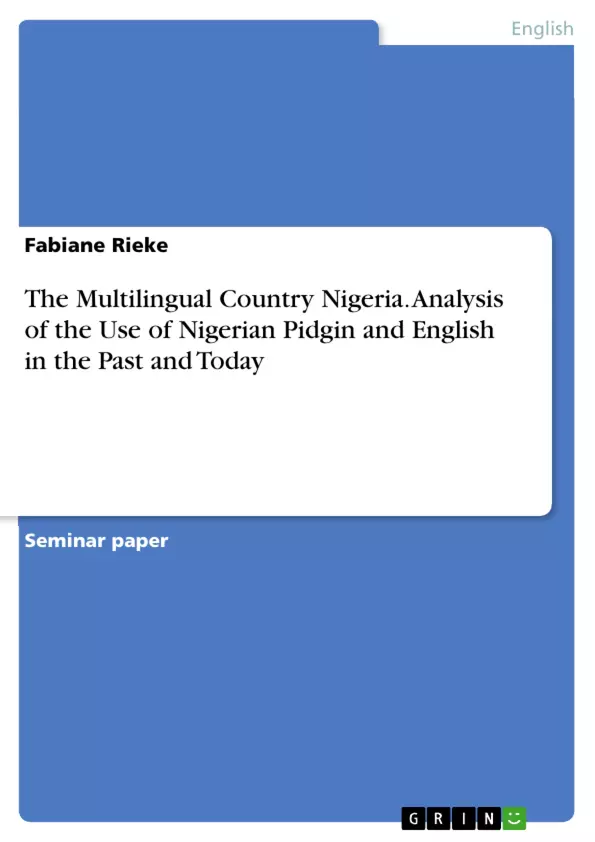Both English and Nigerian Pidgin do not only occur in the described domains, but in individual contexts such as in the media, especially in the field of music. Considering the linguistic spread of Nigerian Pidgin and English, this thesis will concentrate on the two songs "Sweet Mother" by Prince Nico Mbarga, published in 1976, and "I love you" by the twins-duo Peter and Paul Okoye alias "P-Square", presented to the public in 2009. Due to the fact that both songs are sung by native Nigerians, an overview of the Nigerian Pidgin's characteristics will be given in the beginning, which will then be applied to both songs, taking into account their similarities. In a further step, the songs' differences will be analysed, while the possible ascendancy of Standard British English over Nigerian Pidgin shall be considered at the same time. But before outlining all of these aspects, a brief summary of the current language situation in Nigeria will serve as an introduction to the topic, followed by a historical view on the development of both Nigerian Pidgin and English within this country.
Table of Contents
- Introduction
- The History of English in Nigeria
- Nigerian Pidgin English
- Linguistic Analysis on the Basis of the Songs “Sweet Mother” and “I Love you”
- Conclusion
Objectives and Key Themes
This thesis examines the use of both English and Nigerian Pidgin in Nigeria, focusing on their historical development and their current status as means of communication, particularly in the context of music. The paper aims to provide an overview of the linguistic characteristics of Nigerian Pidgin and analyze how these characteristics manifest in popular songs by Prince Nico Mbarga and P-Square, highlighting the similarities and differences between the two songs.
- The historical development of English and Nigerian Pidgin in Nigeria
- The role of both languages in Nigerian society
- The linguistic features of Nigerian Pidgin
- The use of English and Nigerian Pidgin in popular music
- The relationship between Standard English and Nigerian Pidgin in contemporary Nigeria
Chapter Summaries
- Introduction: This chapter introduces the topic of the thesis by examining the historical context of English and Nigerian Pidgin in Nigeria. It discusses the spread of English through British colonialism and the emergence of Nigerian Pidgin as an inter-ethnic language, highlighting the debate surrounding their roles as lingua franca in the country. The chapter also presents the two songs ("Sweet Mother" and "I Love You") that will be analyzed in the thesis.
- The History of English in Nigeria: This chapter provides a detailed history of the spread of English in Nigeria, outlining three main phases. The first phase deals with the early contacts between Nigerians and the British, particularly through trade and missionary work. The second phase covers the period of British colonial dominance and the expansion of English as the language of administration, law, and education. The third phase examines the post-independence period, where English continued to solidify its status as the official language of Nigeria and a symbol of modernization.
- Nigerian Pidgin English: This chapter focuses on the history and characteristics of Nigerian Pidgin English, exploring its origins, its spread, and its role in Nigerian society. The chapter will also delve into the various linguistic features of Nigerian Pidgin.
Keywords
The main keywords and focus topics of the text include: English, Nigerian Pidgin, Nigerian languages, colonialism, post-colonialism, language variation, language contact, diglossia, linguistic analysis, music, popular culture, Prince Nico Mbarga, P-Square, "Sweet Mother", "I Love You".
- Quote paper
- Fabiane Rieke (Author), 2011, The Multilingual Country Nigeria. Analysis of the Use of Nigerian Pidgin and English in the Past and Today, Munich, GRIN Verlag, https://www.grin.com/document/1170505



